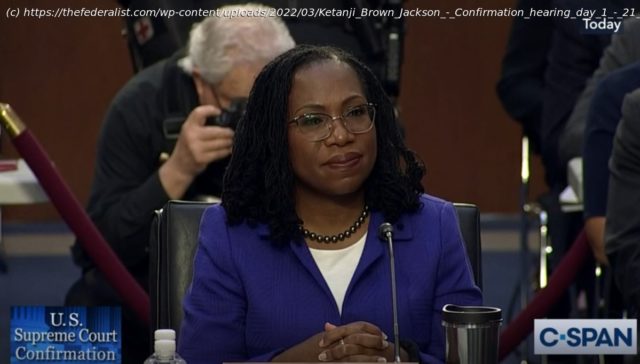Ketanji Brown Jackson’s record on child predators is highly relevant to her qualifications as a Supreme Court judge.
Joe Biden has nominated Ketanji Brown Jackson to be the newest Supreme Court justice, a seat held for life. Immediately, Sen. Josh Hawley brought forward concerns about Jackson’s history of leniency toward child predators. In a Twitter thread, Hawley cited multiple examples of this, using Jackson’s own words and sentencing history as a federal judge. This includes Jackson questioning whether child sex predators should be forced to register as sex offenders. National Review’s Andrew McCarthy weighed in to say that Republicans like Hawley are making a big mistake, and a big deal out of nothing. McCarthy correctly points out that if Republicans are so concerned about this issue, they should make sentences on child predators tougher. But McCarthy wasn’t arguing for tougher sentences, just making a rhetorical point. He went on to compare child sexual abuse imagery to drugs, and claimed the only justification for making these materials illegal is “market theory”—that the consumption of these illicit materials drives the abuse of children in the materials, even though the persons viewing the materials supposedly aren’t abusers themselves. Says McCarthy: “If there were not simple possessors and consumers of illegal narcotics, there would not be a market that drives the much more serious drug-trafficking crimes. Yet no senators have suggested that illegal-drug possessors and users should be sentenced to harsh prison terms, much less mandatory minimums. And the Justice Department generally does not enforce simple possession statutes at all.” McCarthy goes on to point out that 70 percent of judges, including many appointed by Republicans, think current federal mandatory minimums for child pornography are too harsh. According to McCarthy, this must mean these sentences probably are too harsh. In jumps fellow National Reviewer Ramesh Ponnuru with an article that says our child porn laws “ might ” be too weak. Ponnuru correctly points out how wrong the Supreme Court was in 2002 to allow “virtual” child sexual abuse imagery where real children aren’t being abused, and then quickly argues that McCarthy’s view is wrong because these materials certainly harm “our moral ecology.” The real truth highlights both Jackson’s disregard for public safety and how ineffectual and lazy most of the conservative intellectual movement is.
Домой
United States
USA — Criminal It Shouldn’t Be Hard To Condemn Ketanji Brown Jackson’s Leniency For Child...






